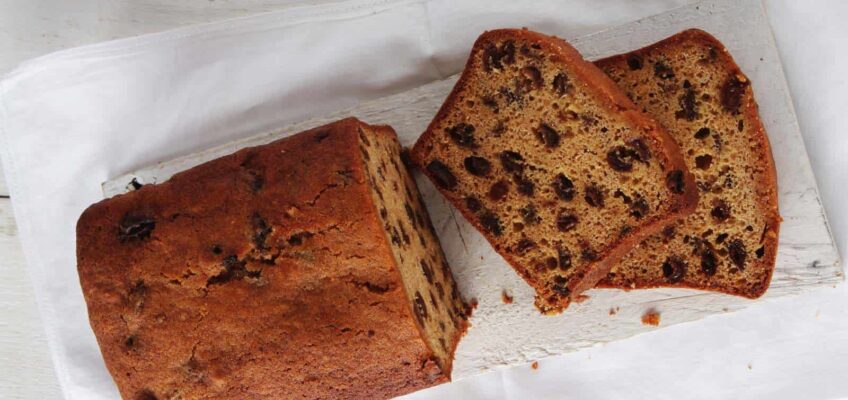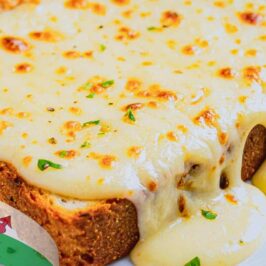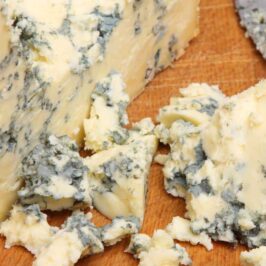What is Lincolnshire Plum Bread?
Lincolnshire Plum Bread, also known as Lincolnshire Plum Loaf, is a traditional fruit bread originating from the county of Lincolnshire in England. Despite its name, it typically contains no actual plums, instead, “plum” is an old English term referring to the “plumped-up” dried fruits that swell during baking or soaking.
This distinctive loaf sits somewhere between a tea cake and a fruitcake, but with a lighter, more bread-like quality that sets it apart from its sweeter cousins. The magic lies in its generous filling of raisins, sultanas, currants, and sometimes prunes or mixed peel, all enhanced with warm spices like cinnamon, nutmeg, or allspice. Traditional recipes call for lard, which gives the bread its characteristic richness and helps create that perfect crumb. The result is a loaf that’s satisfying without being overly sweet, making it versatile enough for any time of day.
This specialty is commonly enjoyed sliced and buttered, or paired with cheese (especially sharp varieties like Lincolnshire Poacher) for a savoury-sweet contrast. It’s a staple in Lincolnshire cuisine, perfect for afternoon tea, snacks, or even as part of a ploughman’s lunch. The loaf has a long shelf life, up to several months if stored properly, and some say it improves with age as the flavours meld.
A Bit of History
The origins of Lincolnshire Plum Bread trace back to the 19th century, rooted in the region’s agricultural heritage and abundance of dried fruits imported through nearby ports like Boston. Early versions were likely homemade fruit breads made by farm workers’ families, using lard from local pigs (Lincolnshire being known as “pig country”) for richness.
The first recorded commercial production is often credited to baker Charles Myers, who baked his initial batch in 1901 after moving to Alford, Lincolnshire. Myers’ recipe, featuring a moist, fruity texture, quickly gained popularity and helped establish it as a county icon.
However, some sources suggest an even earlier history, with a version first baked in 1834 by Mr. Slater Eyre in Louth, Lincolnshire, before Myers refined and popularised it. By the early 20th century, other bakers like the Welbourne family (starting around 1896) and Pocklington’s contributed to its spread.
Today, it’s a symbol of Lincolnshire culinary pride, with artisan bakeries still producing it using traditional methods.
Best Places to Buy Lincolnshire Plum Bread Locally in Lincolnshire
For the most authentic experience, nothing beats visiting Lincolnshire’s traditional bakeries, many of which have been perfecting their recipes for generations. Lincolnshire boasts several artisan bakeries and delis specialising in authentic plum bread, often made with family recipes. Many are in market towns, and it’s worth calling ahead for availability. Here’s a selection of top places to buy Lincolnshire plum bread:
- Myers Bakery (Horncastle): The original home of commercial plum bread since 1901. Their loaf is moist and fruity, pick it up fresh from the bakery or attached deli. Address: 20 Bull Ring, Horncastle, LN9 5HU.
- Welbourne’s Bakery (Navenby): Family-run since 1896, famous for traditional recipes. Their plum bread is a local favourite, available at the shop or nearby markets. Address: 26 High St, Navenby, LN5 0EE.
- Pocklington’s Bakery (Witham Bank, Boston): Known for daily-baked loaves, including a luxury version with cherries. Stocked in their shops and local Co-op stores. Multiple locations; main: Witham Bank West, Boston, PE21 8PU.
- Curtis of Lincoln (Lincoln): A historic deli offering plum bread alongside other local treats like sausages. Great for city, centre shopping. Address: 164 High St, Lincoln, LN5 7NX.
Look for it at farmers’ markets in Louth, Lincoln, or the Wolds for fresh, small-batch options.
Best Places to Buy Lincolnshire Plum Bread Online for UK-Wide Delivery
For those outside Lincolnshire, many bakeries post nationwide. Prices typically range from £4-£6 per 400g loaf, with minimum orders or bundle deals common. Delivery is usually 1-3 days, and loaves arrive well-packaged with long shelf lives. Here’s a selection of the best online retailers, selling authentic Lincolnshire-made Plum Bread:
- Myers Bakery Online Shop: Direct from the originators. Order single loaves or bundles; next-day delivery available. Website: myersbakery.co.uk.
- Lincolnshire Plumbread Company (Modens): High-quality, minimum 6 units (mix and match flavours), free UK postage. Based on a 1930s farm recipe. Website: lincolnshireplumbreadcompany.co.uk.
- Pocklington’s Bakery: Offers traditional and luxury varieties; UK-wide delivery via FedEx. Great for bulk orders. Website: pocklingtons-bakery.co.uk.
- The Cheese Society: Pairs perfectly with their cheeses; free delivery over £60. Sells Myers or similar authentic loaves. Website: thecheesesociety.co.uk.
- Lakings Butchers: Stocks Myers’ version; next-day delivery on orders before 2pm. Minimum £30 order, flat £5.95 shipping. Website: lakings.co.uk.
- Boston Sausage: Affordable Myers loaves; £5.95 flat-rate delivery on £30+ orders. Website: bostonsausage.co.uk.
- Ye Olde Pork Pie Shoppe: Traditional loaves at a discount; shipping calculated at checkout. Website: porkpie.co.uk.
- Heckington Windmill: Sells Pocklington’s-inspired loaves; supports a historic site. Website: heckingtonwindmill.org.uk.
For more options, check stockists lists on bakery sites like Myers for nationwide delis that ship.
How to make Lincolnshire plum bread
Lincolnshire Plum Bread recipes vary slightly by baker, but they generally involve soaking dried fruits in tea (often Earl Grey or black tea) for plumpness, then mixing with flour, spices, and sometimes lard or butter for an enriched dough. Avoid over-salting or using salted butter, as some modern adaptations warn against it for authenticity. Here are two straightforward, traditional recipes to try at home. Both yield one large loaf (about 400-800g) and can be baked in a standard loaf tin.
Classic Lincolnshire Plum Bread Recipe
This version from a reliable source emphasises prunes for added moisture.
Ingredients:
- 225g (8oz) prunes, pitted and roughly chopped
- 50g (2oz) currants
- 50g (2oz) sultanas
- 150ml (5fl oz) strong black tea (or Earl Grey)
- 450g (1lb) strong white bread flour
- 1 tsp ground cinnamon
- 1 tsp ground allspice
- 25g (1oz) butter, softened
- 25g (1oz) lard (or substitute with more butter for a vegetarian version)
- 7g (1 sachet) fast-action yeast
- 50g (2oz) light brown sugar
- 1 tsp salt
- 2 large eggs, beaten
- Milk, for brushing (optional)
Method:
- Soak the prunes, currants, and sultanas in the hot tea for at least 2 hours (or overnight for best results) until plump.
- In a large bowl, mix the flour, spices, yeast, sugar, and salt. Rub in the butter and lard until crumbly.
- Drain the fruits (reserve the tea if needed for moisture), add them to the dry mix along with the beaten eggs. Stir to form a soft dough, adding a splash of the reserved tea if too dry.
- Knead on a floured surface for 10 minutes until smooth and elastic.
- Place in a greased bowl, cover, and let rise in a warm spot for 1-2 hours until doubled in size.
- Knock back the dough, shape into a loaf, and place in a greased 2lb loaf tin. Cover and let rise again for 45-60 minutes.
- Preheat oven to 190°C (375°F/gas mark 5). Brush the top with milk if desired, then bake for 35-45 minutes until golden and hollow-sounding when tapped.
- Cool on a wire rack. Slice and serve with butter or cheese.
Store wrapped in foil in a cool place for up to 3 months.
How to eat Lincolnshire Plum Bread
Most traditionally, it’s served sliced thick and spread with good butter, allowing the rich, fruity flavours to shine through with each bite. Beyond butter, try it toasted with jam, or as a base for cheese boards. It pairs exceptionally with Lincolnshire Poacher (a nutty cheddar-like cheese), Wensleydale, or even blue cheeses for contrast. Some enjoy it warm with custard as a dessert.
Beyond the Loaf
This traditional enriched fruit bread represents the very essence of British comfort food, combining the county’s heritage with time-honoured baking traditions. The bread offers a perfect balance of moist, dense texture and subtly spiced flavour that has made it a beloved staple across the region and beyond.
Modern variations include additions like cherries and nuts, but purists maintain that the original combination of traditional dried fruits and warming spices cannot be improved upon. If you haven’t tried it yet, enjoy exploring this delightful Lincolnshire treat!







